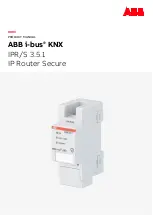
76
Tunnel Mode:
This is the new command for QinQ. The command includes None, 802.1Q
Tunnel and 802.1Q Tunnel Uplink. The figure shows the relationship between 802.1Q
Tunnel and 802.1Q Tunnel Uplink.
Following is the modes you can select.
None:
Remian VLAN setting, no QinQ.
802.1Q Tunnel:
The QinQ command applied to the ports which connect to the C-VLAN.
The port receives tagged frame from the C-VLAN. Add a new tag (Port VID) as S-VLAN
VID. When the packets are forwarded to C-VLAN, the S-VLAN tag is removed.
After 802.1Q Tunnel mode is assigned to a port, the egress setting of the port should be
“
Untag
”, it indicates the egress packet is always untagged. This is configured in Static
VLAN Configuration table. Please refer to the VLAN Configuration chapter in below.
802.1Q Tunnel Uplink:
The QinQ command applied to the ports which connect to the
S-VLAN. The port receives tagged frame from the S-VLAN. When the packets are
forwarded to S-VLAN, the S-VLAN tag is kept.
After 802.1Q Tunnel Uplink mode is assigned to a port, the egress setting of the port
should be “
Tag
”, it indicates the egress packet is always tagged. This is configured in
Static VLAN Configuration table. Please refer to the VLAN Configuration chapter in
below.
For example, the VID of S-VLAN/Tunnel Uplink is 10, the VID of C-VLAN/Tunnel is 5. The
802.1Q Tunnel port receives tag 5 from C-VLAN, add tag 10 to the packet. When the
packets are forwarded to S-VLAN, tag 10 is kept.
EtherType:
This column allows you to define the EtherType manually. This is advanced
QinQ parameter which allows to define the transmission packet type.
Accept Frame Type:
This column defines the accepted frame type of the port. There are 2
modes you can select,
Admit All
and
Tag Only
. Admit All mode means that the port can
accept both tagged and untagged packets. Tag Only mode means that the port can only
accept tagged packets.
Ingress Filtering:
Ingress filtering helps VLAN engine to filter out undesired traffic on a
port. When Ingress Filtering is enabled, the port checks whether the incoming frames
belong to the VLAN they claimed or not. Then the port determines if the frames can be
processed or not. For example, if a tagged frame from Engineer VLAN is received, and
Ingress Filtering is enabled, the switch will determine if the port is on the Engineer VLAN’s
Egress list. If it is, the frame can be processed. If it’s not, the frame would be dropped.
















































